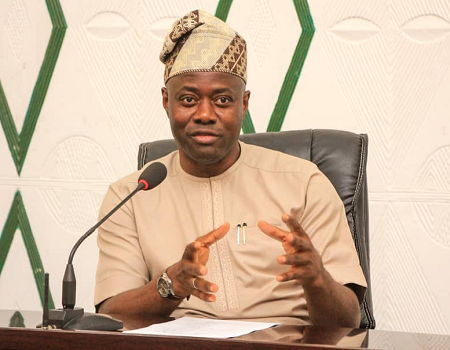Oyo State Governor, Mr Seyi Makinde, on Tuesday, gave the commitment of increasing the state’s Internally Generated Revenue (IGR) before May 29, 2023, to cater for the state’s recurrent expenditure.
Makinde gave this assurance in his keynote address at the Oyo State stakeholders “Poverty to Prosperity” summit held at Emeritus Theophilus Ogunlesi Hall, Ibadan.
He said this target will be achieved through an expansion of the tax base, aggressiveness and innovativeness in the mode of revenue collection, looking for new sources of revenue and a thorough review of the current IGR process and management in the state.
According to Makinde, evidence that the strategies were yielding results is seen in the increase of the state’s IGR to N2.7billion in December from N2billion in November.
ALSO READ: FG challenges governing board of NISS on national security
Among others, Makinde said the measures to increase the IGR will include ensuring wider and more effective enumeration of business and household properties ensuring ease of obtaining land titles, faster approval of building plans, fine-tuning the land use charge, implementing wider, better and faster platforms for vehicle registration and renewal, harmonizing billings to other rates and levies.
“The current trend across states in Nigeria is to see IGR as being synonymous with revenue generated from taxes, partly because other sources of revenue, especially natural resources are on the exclusive list.
“Revenue generated from these natural resources goes to the Federation Account and is then shared between the Federal Government and states. A lot has been said about how this has served as a hindrance to development, and how it has made states unwilling to invest in the management of these resources. But that is only half of the story.
“The other half is that it is possible to raise the IGR of the state without raising taxes. And this is the promise that we made to the people of Oyo State while we were on the campaign trail. We are determined to continue keeping that promise.
“Trends also show Oyo State’s IGR fluctuates; in 2014 it was N16.30bn, but dropped to N15.66bn in 2015, later increasing to N18.88bn in 2016. For 2017, the IGR figures grew to N22.45bn. While in 2018 it grew to N24.67bn. This put our IGR per capita in 2018 at below N3,000 per person. We can definitely do better.
“The commencement of the new strategies put in place to increase IGR produced the positive result recorded in December 2019, as we raised the IGR to 2.7 billion Naira from about 2 billion Naira in November.
“Without the tax, we will be borrowing. Our federal allocation is not enough to pay a salary so we need to improve our IGR. Our target is that by the end of this tenure, that is, on May 29, 2023, our IGR will be enough to cover our recurrent expenditure,” Makinde said.
He assured of judicious use of tax realised is ploughed back into the state through rehabilitation of roads, investment in health, education and security.
Speaking further, he said the state was considering the running of the mass transit system in the state, with the modalities soon to be disclosed.
“In a few months, we are looking to start running a mass transit system in the state. The modalities are being set up and we will communicate the process with you,” Makinde said.
Delivering the lead paper entitled: “Tax Stakeholders, Good Governance and Poverty to Prosperity Agenda,” a Professor of taxation and fiscal matters, University of Lagos, Abiola Sanni, harped on the need for government to give assent to tax bills and work out the legal framework for effective implementation.
While making recommendations for the State, Professor Sanni called for immediate tax reforms, whistleblowing policy to curb tax evasion and continuous tax education, amongst other things, adding that lack of consistency and sufficient investment on tax administration has affected the State taxation drive.
Earlier, in his welcome address, the Commissioner for Finance, Mr Akinola Ojo, explained that the summit would not only focus on generating revenue but also enhance development in the State.
Goodwill messages were taken from the Olubadan of Ibadan, Oba Saliu Adetunji, who was represented by Chief Lekan Alabi; Executive Chairman, Federal Inland Revenue Service, Mohammed Nami; Executive Secretary, Joint Tax Board, Abuja, Mohammed Abubakar and Madam Betiku Oluwayemisi, representative of traders association, amongst others.
The summit was attended by traditional rulers, community leaders, tax experts, traders, market men and women, among other participants.




